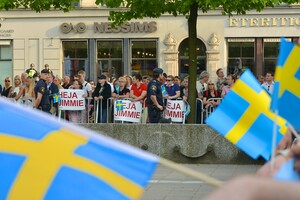The purpose of such measures, voiced by government officials, is to help identify potential perpetrators and thus prevent possible terrorist attacks. Sweden said it was restoring
 border control at ferry terminals, airports and other points of entry into this Scandinavian country, as “there is still a serious threat to public order and internal security,” reports ABC News.
border control at ferry terminals, airports and other points of entry into this Scandinavian country, as “there is still a serious threat to public order and internal security,” reports ABC News.
The Swedish government has said that the temporary control will begin immediately and will last until November 11, which means that travelers will have to show passports and visas for 6 months.
Officials did not mention the specific threat in their public statement, but said the security situation in the country's European region was “extremely serious and the overall level of terrorist threat in Sweden remains high.”
Justice Minister Morgan Johansson noted that once in the European passport-free zone, known as the Schengen area, people can move relatively freely between 26 countries – 22 countries of the European Union, as well as Iceland, Liechtenstein, Norway and Switzerland. The resumption of border controls “creates the conditions for identifying and controlling those who want to enter the country,” Johansson said. “It may also help identify potential perpetrators and thus prevent possible terrorist attacks.” Sweden plans to apply for NATO membership this summer
We recently reported that, according to media reports, not only Sweden but also Finland plans to apply for NATO membership in the summer. However, Prime Minister Anderson declined to confirm this. Alliance Secretary General Jens Stoltenberg has already commented on the potential expansion of the defense bloc. He noted that if the two countries decide to apply for membership, they can count on a positive response. , Is realized. Ironically, it was Russia that contributed to this.
Read also: NATO has stated its readiness to increase its presence near Sweden's borders and in the Baltic Sea
Some years ago, the issue of joining the two adjacent territories RF of the Scandinavian countries was considered controversial. However, after the open Russian invasion of Ukraine , it became unequivocal. The war in Ukraine has forced us to reconsider security issues, and the “potential goals” of the Russian Federation are of particular concern.




